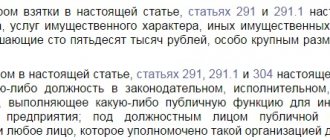The Russian state gives citizens equal rights, guaranteeing by law the completeness of their implementation and protection. Where the line is drawn between defending your rights and encroaching on the rights of others, the comments to Art. 330 of the Criminal Code of the Russian Federation “Arbitrariness”.
A criminal case can only be initiated at the request of the injured party. Often the victim is not aware of the violation of his rights, which helps the criminal to evade responsibility.
What is arbitrariness
In the Criminal Code of the Russian Federation, arbitrariness is understood as actions that violate the established procedure for exercising the rights of a citizen. At the same time, the attacker’s own intentions may seem respectable.
The crime falls under Art. 330 of the Criminal Code in the case when illegal actions cause material or moral damage. Otherwise, the act is qualified as an administrative offense under Art. 19.1 Code of Administrative Offenses of the Russian Federation.
The amount of damage, as well as its existence, is determined by the court.
Commentary to Art. 330 Criminal Code
1. The objective side of arbitrariness is characterized by the commission of actions: a) a person acts arbitrarily, choosing a form of behavior in violation of the normative (law or other regulatory act) established procedure for the exercise of rights; b) for the implementation of a real (existing, enshrined) or alleged (existing only according to the conviction of a person) right; c) provided that the legality of the action is disputed by the interested individual or legal entity in a judicial, administrative, claim, official or other manner before or during its commission.
2. As a result of unauthorized actions, an organization or a citizen (victims can be not only persons who challenge the legality of the actions of the perpetrator) suffers significant harm. The type of harm is not defined by law and can be expressed in property damage, lost profits, moral harm, violation of the constitutional rights of citizens, disruption of the organization’s activities, etc. The amount of damage as significant is determined taking into account the specific circumstances of the case at the time of the commission of arbitrary actions, depending on the amount of damage or the importance of the violated rights and interests.
3. Responsibility for some arbitrary actions occurs according to special norms, for example, under Art. 137 of the Criminal Code (unauthorized disclosure of information constituting personal or family secrets), Art. 139 of the Criminal Code (unauthorized entry into a home, committed against the will of the person living in it), Art. 285 or 286 of the Criminal Code (commission by an official of actions contrary to the established procedure using his official position).
Algorithm of actions of a victim of arbitrariness
Having become a victim of arbitrary actions, a citizen should heed the following advice:
Have a question for a lawyer? Ask now, call and get a free consultation from leading lawyers in your city. We will answer your questions quickly and try to help with your specific case.
Telephone in Moscow and the Moscow region: +7
Phone in St. Petersburg and Leningrad region: +7
Free hotline throughout Russia: 8 (800) 301-39-20
- To bring the criminal to justice, it is necessary to file a complaint. The application can be sent to a higher administration, prosecutor's office or police. The complaint must be submitted in writing or electronically. In the latter case, the application should be submitted through the website of the authorized organization. After considering the electronic complaint, the citizen will receive a response to the specified email address. Under no circumstances should you complain verbally. Such appeals do not bring results.
- The complaint must be drafted correctly. The circumstances of the case are described briefly, in simple and understandable language. If the applicant is not confident that he can draw up such a document on his own, he should seek help from a specialized lawyer.
- In the statement we refer to those legislative acts that were violated.
- Evidence of arbitrariness must be attached to the complaint. Otherwise, the charges will be considered unfounded and the application will not be considered.
- Having received a refusal from the police, you should contact the prosecutor's office, and then the court.
We contact the higher administration
This method is good if arbitrariness was committed by an official. The most convenient way to file a complaint is to use the organization’s website. Here the user can fill out a complaint sample or seek the help of a consultant.
Another option is to send an application by registered mail with acknowledgment of receipt. In addition, the applicant can visit the department in person, handing over the documents to a specialist for signature.
Contacting the police
In most cases, arbitrary actions involve damage to the injured party. To bring the culprit to justice, the victim can contact the police. He will also have to write a statement at the department. It is compiled according to general rules. It is important to indicate the circumstances of the case in the document, refer to legislative norms and attach evidence of arbitrariness to the application. These can be scans of correspondence on the Internet, letters, audio or video recordings. If there are witnesses, they should be listed in the application.
Having accepted the application, the police officer initiates a preliminary check. If there are circumstances indicating that a crime has been committed, the investigator initiates a criminal case.
Filing a complaint to the prosecutor's office
This organization is engaged in protecting the rights of citizens of the Russian Federation. You can submit an application to the prosecutor's office at any stage of the case. For example, a citizen can contact this organization as soon as he discovers the fact of arbitrariness. It is also possible to file a complaint with the prosecutor’s office in the event of inaction by the police or administration.
When making such a statement, you need to pay attention to the following points:
- The text of the complaint is written in a business style. Sentences should be short and concise. Prolonged retreats are unacceptable, just like mistakes and blots.
- It is important to back up your claim with evidence. If the evidence base is missing or insufficient, the application may be left without consideration.
A well-written application should include the following points:
- "A cap". This section indicates the details of the applicant, the name and address of the organization to which the complaint is being filed. Also in the header you need to indicate the details of the manager to whom the application is being submitted.
- Descriptive part. Here you need to indicate the reason for the dispute and general circumstances. For example, the actions of the culprit and the victim, the damage received. The organizations that the applicant has previously applied to should also be listed.
- Request. Most often we are talking about initiating a criminal case. In this case, the applicant must refer to the current legislation.
- List of documents confirming the applicant’s words.
- Date and signature of the applicant.
Use of threat of violence
Judicial practice under Art. 330 of the Criminal Code of the Russian Federation shows that arbitrariness is often accompanied by threats to the victim about the use of violence. This should be understood as an expression by the perpetrator of the intentions of the possibility of using any physical violence against them, including murder or grievous harm. The threat must be as realistic and believable as possible.
Second commentary to Art. 330 of the Criminal Code of the Russian Federation
1. The objective side of the crime provided for in Part 1 of Art. 330 of the Criminal Code, includes an unauthorized (unauthorized) action, consequences (significant harm) and a causal relationship between the act and the consequences.
The act as part of this crime has various forms: unauthorized exercise of a real or perceived right contrary to the existing order, commission of other actions contrary to the established order. In the unauthorized exercise of a valid right, the normative procedure for its implementation is violated. When exercising an alleged right, it is necessary to comply with the order of its establishment and only then - the order of its implementation. Thus, arbitrariness in the exercise of an alleged right violates both the procedure for establishing the right and the procedure for its implementation. Arbitrariness can also be expressed in the commission of actions to which the perpetrator obviously has no right.
2. Significant harm as a consequence of arbitrariness is assessed in each specific case of arbitrariness, taking into account the amount of material damage (including lost profits), taking into account the significance, value of the violated rights and legitimate interests of other persons, society or the state.
3. The subjective side of this crime is characterized by direct intent.
4. Subject - a person who has reached the age of 16 years.
5. The qualifying feature is the use of violence or the threat of its use. Part 2 of Art. 330 of the Criminal Code covers any consequences of violent actions, except for causing serious harm to health and death. When these consequences occur, additional qualification is required under the relevant articles of the Special Part of the Criminal Code. The threat of murder or infliction of grievous bodily harm does not require additional qualifications and is covered by the characteristics of part two of Article 330 of the Criminal Code.
Arbitrariness: concept, signs, qualifications. Discrimination from related crimes.
Arbitrariness is the unauthorized commission of any actions, contrary to the procedure established by law or other legal acts, the legality of which is disputed by an organization or a citizen.
The main direct object of the crime is the procedure established by law or other regulations for citizens to exercise their rights and obligations.
An additional object of encroachment is the legal rights and interests of other citizens or legal entities.
With qualified self-government, an additional object is the freedom and health of the individual.
The subject of the crime is optional; it can be a thing, property that is the object of the dispute.
Victims can be individuals and legal entities who have suffered significant harm.
Objective side. characterized by the commission of actions expressed in an unauthorized manner, contrary to the procedure established by law or other regulatory act, the legality of which is disputed by an organization or a citizen, if such actions caused significant harm.
Composition - material . There must be a causal connection between unauthorized actions and causing significant harm
An action is an unauthorized commission of any action, contrary to the established procedure, the legality of which is disputed by an organization or a citizen.
Signs:
A mandatory sign of arbitrariness is causing significant harm to organizations or citizens.
- these are always active actions aimed at realizing a real or imaginary right; (as opposed to theft)
-they are committed contrary to the established procedure: without completing the relevant documents, without following the established procedure, etc.; -the order is established not only by law, but also by another regulatory legal act (decree of the Government of the Russian Federation, regulatory act of a local government body, etc.).
-challenging the legality of such actions by a citizen or organization means a statement by these entities in one form or another about a violation of their rights: an appeal to the police, an application to the prosecutor’s office, filing a statement of claim in court, an appeal to the executive authorities, etc. Actions can be challenged in court , administrative, disciplinary procedures. This is possible at the time of committing arbitrary actions, after they have been committed.
The consequence is significant harm. The recognition of harm as significant depends on the assessment of the significance of the damage by the injured individual or legal entity, on their actual property status or financial condition. Significant harm can be expressed in causing material, property, financial damage, violation of constitutional rights and freedoms, etc. Causality
.
There is no corpus delicti if : a) rights and obligations are exercised without permission, but their legality is not disputed by third parties; b) the actions of a person are disputed, but the implementation of rights and obligations is carried out in accordance with legal acts. Subjective side – any Subject – general, from 16 years old.
Qualified staff. Part 2 - with the use of violence or the threat of its use.
Use of violence - causing harm of any severity, with the exception of causing serious harm to health or death to the victim. If death or serious harm to health is caused as a result of arbitrary actions, it requires additional qualification under articles on crimes against life and health. Arbitrariness associated with the threat of murder or causing grievous harm to the health of the victim, beatings, minor harm to health and moderate harm is fully covered by the commented norm, and additional qualifications under Art. 112, 115, 116, 119 are not required.
Difference from Art . 161 : the subject of arbitrariness can be property, but not always, whereas in robbery the subject in the form of property is obligatory.
An example of arbitrariness would be situations where the culprit arbitrarily seizes from the debtor or destroys property acquired with funds borrowed from him; takes someone else’s thing, leaving something of equal value in return, etc.
. From extortion:
1) object: arbitrariness - social relations that provide, based on the provisions of the law or other regulatory legal acts, the procedure for performing any actions to acquire, change and terminate rights, as well as the implementation by individuals and legal entities of their duties
The direct object of extortion includes other groups of social relations: 1) social relations of property, regardless of its form; 2) social relations that provide physical and moral benefits to the individual.
2) objective side: The objective side of extortion consists only in the active actions of the perpetrator, forcing the victim to fulfill the property demand of the extortionist. Disposition Art. 330 of the Criminal Code also contains an indication of the possibility of fulfilling the objective side of this crime only by committing any actions. However, in our opinion, a violation of the established order in the sense of Art. 330 of the Criminal Code of the Russian Federation, in some cases, the inaction of a person should also be recognized when the perpetrator was obliged to act in accordance with a legal act, agreement or other decision of citizens or officials (for example, refusal by the head of an enterprise to transfer his powers to a person newly appointed to this position).
3) Subject: extortion – 14 years, arbitrariness – 16 years
Abuse of power
Exceeding official authority
1) Persons who are harmed: 330 - organizations and citizens, 286 - citizens, organizations, society, state
2) subject: 286 – official, 330 – general subject
Assignment of powers of an official: 288
Subjects under 228 are civil servants or local government employees who are not officials who assume the powers of officials. In case of arbitrariness, the perpetrator does not assign to himself the title of an official, but acts on his own behalf, although in essence he assigns to himself the functions of officials.
2. The principle of legality and publicity in criminal proceedings.
Legality is a general legal constitutional principle.
Legality in relation to criminal proceedings means the requirement to carry out the proceedings in strict accordance with the law, to comply with all norms of substantive and procedural law, which applies to all officials responsible for the proceedings and all other participants in criminal proceedings.
The court, judge, prosecutor, investigator, head of the investigative team, head of the investigative department, the body of inquiry, the head of the body of inquiry, the interrogating officer and all other entities carrying out criminal proceedings have no right to apply a federal law that contradicts the Code of Criminal Procedure of the Russian Federation.
Inquiry bodies, investigators, prosecutors, courts, etc., realizing their legal status, must correctly interpret and strictly comply with the norms of both procedural and substantive law. All written procedural decisions of state bodies and officials carrying out criminal proceedings must be legal, justified and motivated.
Decisions are recognized as justified only when there are legitimate factual grounds for this. The content of a written, motivated decision sets out the evidence (information and circumstances) that served as the grounds and conditions (motives, objectives, etc.) for making this decision.
The principle of publicity.
The principle of publicity in criminal proceedings means the obligation of state bodies and officials carrying out criminal proceedings, in all cases of detection of a socially dangerous act, to investigate and resolve the criminal case, to ensure the rights and legitimate interests of participants in the criminal process.
It seems to us that we can talk about the following forms of expression of the principle of publicity
1. If protecting the rights of citizens is the duty of the state, then the duty of the state is to protect and protect the rights and freedoms of citizens from criminal attacks represented by state bodies and officials, whose duty is to carry out criminal prosecution, resolve the case on the merits and restore social justice.
2. The prosecutor, investigator, inquirer, body of inquiry in each case of detection of signs of a socially dangerous act are obliged to initiate a criminal case, regardless of the discretion of individual citizens, officials and organizations, and take all measures to disclose and investigate the crime. Establish all the circumstances that are subject to proof in a criminal case (Article 73 of the Code of Criminal Procedure of the Russian Federation).
3. When investigating a criminal case, the authorities carrying out criminal prosecution have the responsibility to explain and ensure the rights of participants in criminal proceedings, including the responsibility to ensure the right to defense and personal safety.
4. When resolving a criminal case, the court is obliged to examine the evidence presented by the defense and the prosecution, verify and evaluate it, and on the basis of which render a verdict (guilty and acquittal).
In accordance with the principle of publicity, criminal prosecution in the vast majority of criminal cases (cases of public and private-public prosecution) is carried out on behalf of the state by authorized officials - the prosecutor, the head of the investigative body, the investigator, the head of the inquiry unit and the interrogating officer. Their duties are that, within the limits of their competence, they must take all measures provided for by law to establish the occurrence of a crime, to expose the person or persons guilty of committing a crime.
According to the principle of publicity, the court administers justice in criminal cases on behalf of the state.
The public nature of criminal proceedings also lies in the fact that in a number of cases the investigator, as well as the interrogating officer, with the consent of the prosecutor, is authorized to carry out criminal prosecution in criminal cases of private and private-public charges, regardless of the will of the victim. These cases are conditioned by certain conditions that characterize the state of the victim: the commission of a crime against a person who is in a dependent state or for other reasons is not able to independently exercise his rights.








